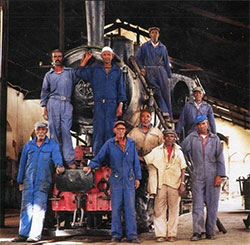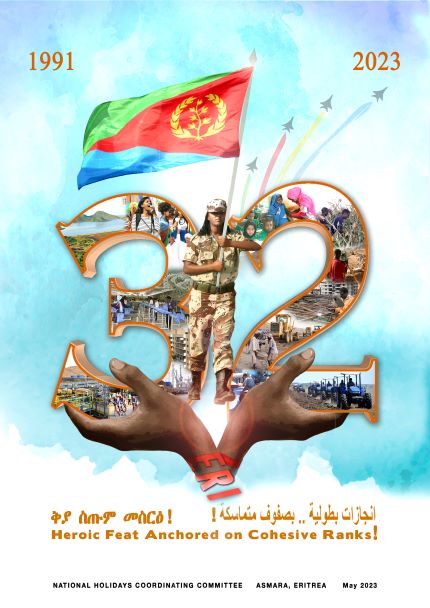ERITREA : Workers alone pave the road to development
 by shabait In Eritrea, those who were forgotten, neglected, and were made passive members of the society, including workers, were transformed to become active actors in wining the liberation struggle. Eritrean workers alongside other social classes liberated and emancipated themselves and gave their life to the liberation and emancipation of the whole society.
by shabait In Eritrea, those who were forgotten, neglected, and were made passive members of the society, including workers, were transformed to become active actors in wining the liberation struggle. Eritrean workers alongside other social classes liberated and emancipated themselves and gave their life to the liberation and emancipation of the whole society.
Eritrean struggle for independence relied on the support of workers, farmers, pastoralists, professionals and intellectuals. Although all members of the society participated in the struggle, the support of workers was decisive.
Taking into account the contribution of workers and other formerly neglected sections of the society, independent Eritrea must be a country where workers work peacefully with secured rights. The country must continue to push toward the implementation of a policy that results in the creation of more jobs. The employment condition and the quality of employment of the working people who are at the front lines of production must be improved. In order to enhance their productivity, attempts have been made to improve the knowledge and skills of the workers. We must keep on raising the quality of our workforce so as to cultivate highly competent workers.
During the struggle for and defence of independence the secret of our victory lay in the selfless and gallant fighter who was committed to just cause. In the struggle for prosperity, too, the human element should be given a central position more than any other resource. The national charter of Eritrea clearly states the decisive role of the human factor: “Even though we need foreign aid and investment, it is primarily the human aspects by which we build Eritrea: strong will, diligence, efficiency, the work ethic, discipline, ability and skills, and inventiveness.” The quality of the working population is a matter of extreme importance for Eritrea in order to achieve its objectives. In this age of competition, the prosperity and modernization of Eritrea is unthinkable without a creative, competitive and cooperative work force.
Internationally, the first of May is celebrated as the workers’ holiday and has been celebrated officially in Eritrea since independence. The celebration of May Day goes back to the times of the liberation struggle. In the struggle for independence, Eritrean workers alongside the other segments of the society played a great role. Before the armed struggle, the peaceful political resistance movement led by workers played a great role in raising the nationalist awareness among the people. The demonstration of workers, in Eritrea’s major towns, against Haileslasie regime was among the proudest moments of history. To end the Eritrean resistance, Haile Selassie’s regime hunted, imprisoned, tortured and murdered hundreds of patriots. The Eritrean Liberation Movement (ELM), the first clandestine movement for independence, enjoyed the participation of all Eritreans, especially that of workers and students.
The national idea started to grow and mature, as it began to be trusted and accepted by the youth, students, and workers.
Eritrean workers are among the first in Africa to advocate for the respect of their rights, fight for and champion national liberation. The participation of the workers transformed the technical and organizational capacity of Eritrean revolution. EPLF worked very hard in the formation of mass organizations to organize the Eritrean masses on the basis of their social status into associations of workers, peasants, women, students as well as professionals.
Likewise, the EPLF’s mass workers organization was established in 1979 at a national level. Today, the National Confederation of Eritrean Workers (NCEW) is one of the most prominent civil society organizations in Eritrea.
In its first organizational congress in 1977, the EPLF officially announced its National Democratic Program and its objectives include safeguarding the social rights of workers and women. In the second organizational congress in 1987, too, safeguarding the rights of workers held a special attention. It recognized that workers shoulder the heaviest tasks for the development of the country’s industry and agriculture. In an attempt to increase their productive potential the congress agreed to abolish the administration, laws and sham trade unions set up by Ethiopian colonialism and its collaborators to exploit and oppress E r i t r e a n workers. Under Ethiopian rule, the toiling masses were h u m i l i a t e d and workers and peasants, pillars of the society, were denied their dignity.
Work place is second only to the home or residence of its workers. Work place offered the strongest bond of human s y m p a t h y , outside of the family relation. The Labor Proclamation of Eritrea No.118/2001 defines the “Conditions of work” as the entire field of employee–employer relations and shall include, with out limitation, hours of work, wages, annual and other forms of leave, compensation to employees for occupational diseases or accidents, redundancy, disciplinary and grievance producers and any other employee benefits and responsibilities. Eritrean workers along with other social classes are fighting to make Eritrea a country of justice and equality where dignity and basic human rights are respected. The Labor Proclamation of Eritrea and the improved laws are meant to protect the rights of every citizen including workers.
According to the Labor Proclamation of Eritrea, “Employee” means any person who renders services of a physical or intellectual nature, for a definite or indefinite period under the direction of an employer for an agreed employment.
The proclamation specifies the “Regular hours of work” in Articles 48 of the proclamation to be eight hours a day and forty-eight hours a week. We have to earnestly follow the implementation of the “Conditions of work” as stipulated in the Labor Proclamation of Eritrea and must treat working people with great respect. Throughout history it’s not the natural but human laws that have turned some people into slaves and others into masters. So the National Confederation of Eritrean Workers must keep on introducing and adopting laws that ensure the interests of the workers.
Building an economy is much harder than achieving national independence and sovereignty. To bring about independence the people of Eritrea paid heavy sacrifices. Similarly, to build a robust economy and to make Eritrea a country of prosperity we need to toil along clear principles. Building a national economy is a great cause that requires a great spirit. Workers who have made exceptional contributions to oust colonization have again a historical responsibility of ousting poverty. Now, with the conclusion of the state of war with Ethiopia, we are going to live in a great and inspiring time. Eritrean workers are now facing the task of building a national economy that can sustain and uplift the Eritrean society. This great and unprecedented cause that we are currently advancing is only accomplished by hardworking and inventive workforce. Therefore, the effort to turn Eritrea to a modern and prosperous country depends on working people.
Eritreans are known as a hardworking and inventive people. We must devise ways to foster the working spirit of our people and enrich the ‘wefera’ work ethic to accumulate strength. Unless we work collectively we wouldn’t succeed. Yuval Noah Hariri in his book ‘A brief history of mankind’ has indicated that it’s cooperation in extremely flexible ways that enabled Sapiens to rule the world, whereas ants eat our leftovers and chimps locked up in zoos and research laboratories. Work is an activity that human beings engage in by nature. Work, creativity and cooperation have been important drivers of human progress. The road to development is paved by intelligent, moral and hardworking workers. Exertion without cooperation wouldn’t bring solution. Therefore, in order to make a difference, workers must work and cooperate for a common goal.

